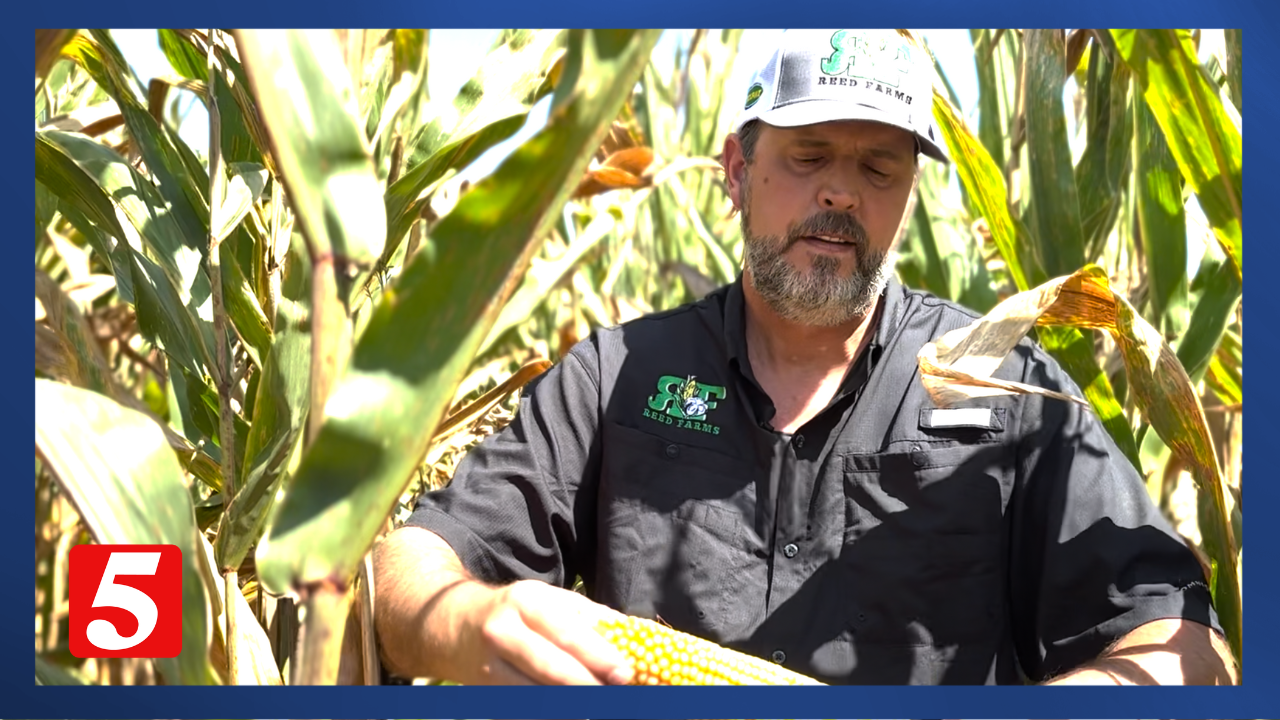ELORA, Tenn. (WTVF) — The crunch of the corn stalks isn't exactly a welcomed sound to Eric Reed.
Their brown and sometimes black roots are indicative of a much larger issue — a persistent drought that has haunted this year's corn crop in southern Tennessee.
Watch my reporting with Eric in the player above, including him out in the field and in his combine.
Reed is a high-yield corn grower who sells his corn to Jack Daniels in Lynchburg to contribute to the production of Tennessee's prized liquor.
But on some of the fields among his 500 acres, he's simply given up.
"There is no way a corn plant can take 37 days of 100-plus-degree temperatures, high humidity and zero rainfall," Reed said.
The Middle Tennessee drought this summer
In July, I noticed browning corn and wilting soybeans. Growing up around row crops, I knew that wasn't a good sign.
That led me to check the US Drought Monitor every week that it came, usually on Thursdays.
In Lincoln County where Reed lives, he's been in a drought all summer. I found him through a viral social media post where he highlighted the problem.
On one side, Reed showed shriveled corncobs from a field he had given up on this season. On the other side was a full corn cob.
The shriveled corn hadn't had any rain. The full cob had.
He explained that he goes out every Monday to check the tissue samples of corn stalks to understand the health of his fields.
"You’ll have good ear, good ear and then three missing, and not even have one with an ear on it," Reed said. "And it doesn’t take but just a little bad corn to drag your average way down."
This year, Reed said he will have to use his crop insurance. He said most don't understand that crop insurance isn't like car insurance, where if someone totals a car, insurers write a check for what it's worth.
Crop insurance is more of a safety net, but it doesn't cover the entire cost of a lost crop.
As of late August, Reed had started combining. A bad crop of corn makes it hard to calibrate the combine.
When the grain comes into the harvester, there's a drum in the machine rotating around and around. There's also a cage — around six inches away — that helps the grain fall off the cob. If farmers don't keep that area full of grain, farmers can end up with more trash mixed in with good grain.
Crop adjusters will be all over Middle Tennessee looking at fields, weigh tickets and grain bins to see what farmers are owed.
Why he keeps trying
For Reed, he knew this year's corn conditions could really devastate some farmers.
However, he said getting out of the business isn't really an option for the majority in farmers in Middle Tennessee.
"A lot of us have notes — equipment notes, land notes," Reed said.
Reed said he understands those who have had to. He has seen the for sale signs in his small enclave in Lincoln County. As Tennessee loses farmland and experiences extreme weather, Reed said it could feel like the perfect storm.
A University of Tennessee-Knoxville study showed that Lincoln County has lost nearly 6,100 acres of farmland in the last decade. He knows he will hang on. He hopes others will do the same.
"We can't afford to give up," he said.
Did the drought affect you?
Reed said farmers need to go on board with better data reporting. These are called condition monitoring observer reports.
So far this summer, Tennessee has 251 reports. The most reports came in at the end of August.
The USDA will take your feedback on the drought with these questions:
- How dry or wet is it?
- How much experience do you have the with conditions there?
- How many times in the past have you seen it like this?
- When was it most recently like this?
- How localized or widespread are the conditions you are reporting?
- How are range conditions at this time?
- Livestock production?
You can also submit photos.
Do you have more information about this story? You can email me at emily.west@newschannel5.com.

The Jefferson Street Sound Museum is a great little gem in North Nashville. The founder and curator turned his home into a museum to keep the legacy of historic Jefferson street alive. Now, it's been named a stop on the U.S. Civil Rights Trail. Aaron Cantrell takes us inside.
- Lelan Statom




